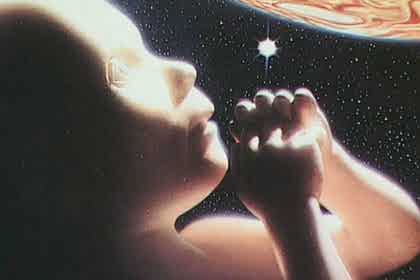 firstborn
firstborn Entries in firstborn (1)
The Womb of Heaven Has Been Opened
 Friday, February 19, 2016 at 12:53PM
Friday, February 19, 2016 at 12:53PM  Through the new birth we possess our heavenly citizenship—not a citizenship that comes in handy when we die, but a citizenship that can change the way we think and act now. Jesus is not only our Lord and savior; he is the firstborn of a new race. “Firstborn” means the pattern has been set. It means others will follow. Those who are born from above receive heaven’s DNA here and now.
Through the new birth we possess our heavenly citizenship—not a citizenship that comes in handy when we die, but a citizenship that can change the way we think and act now. Jesus is not only our Lord and savior; he is the firstborn of a new race. “Firstborn” means the pattern has been set. It means others will follow. Those who are born from above receive heaven’s DNA here and now.
The New Testament refers to Jesus as the “firstborn” in at least five contexts: as Mary’s firstborn child (Luke 2: 7 & 23), as the “first born among many brothers” (Romans 8:29), as the “firstborn over all creation” (Colossians 1: 15), the “firstborn of the dead” (Colossians 1: 18 and Revelation 1:5), and finally as God’s firstborn son (Hebrews 1: 6). In the first century the concept of firstborn was well known, both in the natural sense and in a spiritual sense as well. You can find these references to Jesus as the firstborn in the gospels, the letters of Paul, the preaching of Hebrews and the book of Revelation. Rarely do we find one repeated idea spanning so many New Testament genres.
Let’s do some deep study: when Jesus was born to Mary he entered the world with a specific Jewish identity—that of a firstborn son. Throughout the Bible narrative the firstborn son was special. The firstborn was set apart to the Lord Himself (Exodus 13:2). The firstborn was the one who “opened” the womb: after one child was born, there was an expectation that more would follow. This idea that more children will follow the firstborn is also the sense of Paul’s passage in Romans. “For those God foreknew he also predestined to be conformed to the likeness of his Son, that he might be the firstborn among many brothers.” (Romans 8:29) God intended that after Jesus many more of his brothers and sisters would follow. In Colossians “firstborn” means more than birth order, it means the highest place: Jesus is the “firstborn over all creation,” that is, nothing in the created realm can equal him. Paul then explores another image immediately by recognizing that just as Jesus conquered death, so could his followers: “And he is the head of the body, the church; he is the beginning and the firstborn from among the dead, so that in everything he might have the supremacy.” (Colossians 1: 15&18) The resurrected body of Jesus is beautiful and glorious beyond telling. We, too, will receive this glorious resurrected body. Finally, the writer of Hebrews states plainly that Jesus is not only the firstborn of Mary, but born of God himself.
Put all these statements together: The Father desired to have many children, but his firstborn Son would occupy the highest place by virtue of birth order and by virtue of his supremacy. Jesus is unique, he has the highest place, but he also makes possible a new creation, a group of people called the children of God. This is you and me! Jesus is the “last Adam” (1 Corinthians 15:45); Paul calls everyone who follows Jesus a “new creation.” (2 Corinthians 5:17) We are the new creation, those born from above, in the image of the Great Firstborn Jesus. Do you see the wonder of your new birth—that you were “born from above”?
John’s gospel is famous for the encounter between Jesus and Nicodemus (chapter three). Evangelicalism has drawn the phrase “born again” from this chapter, which details a discussion between a teacher in Israel and the Lord himself. Jesus told Nicodemus the born again experience was necessary to see the Kingdom of God (John 3:3). A more literal rendering of the phrase “born again” is actually born from above. The Holy Spirit chose his words carefully: while affirming the need for a spiritual rebirth, the words “born from above” point to the source of that birth—it comes from above. It comes from heaven. This was true of Jesus, who came from heaven to earth, and it is true of those who follow him. The source of the new birth is from above.
Jesus the firstborn has opened the womb of heaven. In following, everyone who is born from above has the resources of heaven available. The nature and the power of the resurrection dwell in each new child of God. This is no mere formality: because the womb of heaven has been opened by Jesus, the firstborn, each of us has the potential to live heavenly lives now, on earth. Why settle for an identity as earth-bound people who wait for a ticket off this planet? Let’s live into the possibilities that, through Jesus, Heaven is born in us even now. Where will you start?

